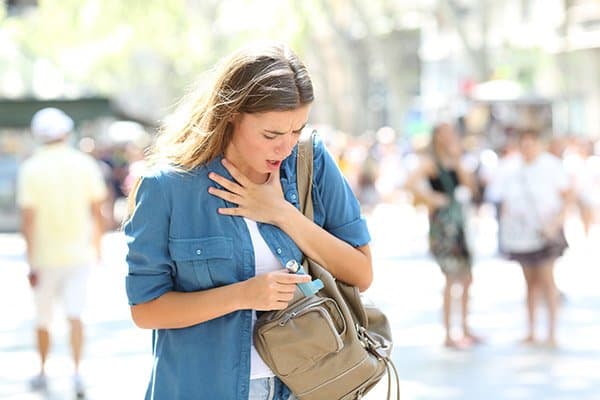As we launch into spring, many people unfortunately find their desire to be outside more enjoying the warmer weather and longer daylight hours impeded by allergies and the possibility of an asthma attack. While the two are often talked about in the same context, they are not the same – although severe allergies my precipitate an asthma attack. A previous First Aid Handbook blog reminds us that Texas is one of the worst states for environmental allergies (Have you ever heard the expression, “If it doesn’t grow here, it blows here”?), so we typically hear and read about them both at this time of year.
National data based on results of surveys, published for 2016, indicate that slightly over 8% of children and adults in the US have asthma, with more females than males having the disease. Within three broad ethnic groups, 8,3% Whites, 11.6 % Blacks, and 6.9% Hispanics have asthma. Asthma affects people of all ages, but most often begins in childhood.
What is asthma?
Unlike allergies, which typically are better or worse depending on the day and time of year, asthma is a chronic disease that affects your airways – the tubes that carry air in and out of your lungs. If you have asthma, the inside walls of these airways become inflamed (or sore) and swollen, making them very sensitive to irritants and causing them to become narrower and less able to provide adequate air to your lungs.
The exact cause of asthma is unknown, but many researchers think that an interaction between genetic and environmental factors is likely to allow the illness to develop. Most, but not all, people who have asthma also suffer from allergies.
What are the symptoms of asthma?
The most common symptoms include:
- Wheezing
- Shortness of breath
- Chest tightness
- Coughing (especially in the early morning and/or at night)
However, not everyone who has asthma has some or all these symptoms, and some people who have asthma do not have the symptoms. A definitive diagnosis is made by a healthcare provider using lung function tests, a medical history, and a physical exam. Allergy testing may also be done.
What triggers an asthma attack?
When asthma symptoms become worse than usual, it is called an asthma “attack.” Irritants or things a person is allergic to can trigger an asthma attack, such as: dust, pollen, pet dander, tobacco smoke, and even some foods; in other people, exercise, stress, infections, and even cold air can trigger an attack. Asthma is different for each person. Severe asthma attacks may require emergency care and it is important to know the signs and seek treatment quickly.
How is asthma treated?
Asthma is a long-term disease that has no cure; the goal is to manage and control it to promote maximum quality of life. In all cases, patient and healthcare providers work together to manage care. Although managing the disease in young children can be more challenging, children aged 10 or older (or younger!) should take an active role in their care.
Asthma is treated with two kinds of medicines: quick-relief medicines to alleviate or stop asthma symptoms and long-term control medicines to prevent symptoms. Triggers in the environment which make the asthma worse should also be removed or avoided. The level of asthma control can vary over time and with changes in home, school, or work environments. These changes can alter how often you’re exposed to the factors that can worsen your asthma.
Asthma treatment for certain groups of people—such as children, pregnant women, or those for whom exercise brings on asthma symptoms—will be adjusted to meet their special needs.
Integrity Urgent Care is pleased to offer management of asthma as part of our complete services. We’re never more than a phone call away and are happy to serve you at any of our four locations, 8 am – 8 pm every day of the week. Be well!
Resources:
National Center for Environmental Health. Asthma. Centers for Disease Control and Prevention [online]. Last reviewed 24 Apr 2018 [accessed 18 Mar 2019]. https://www.cdc.gov/asthma/
National Heart, Lung, and Blood Institute. Asthma. US Department of Health & Human Services. Health Topics [online]. [accessed 18 Mar 2019]. https://www.nhlbi.nih.gov/health-topics/asthma
National Library of Medicine. Asthma. MedlinePlus [online]. Last updated 7 Feb 2019 [accessed 18 Mar 2019]. https://medlineplus.gov/asthma.html



